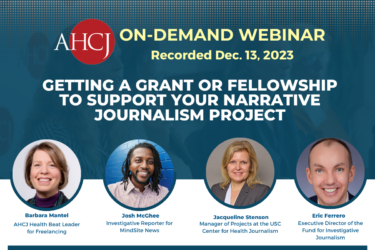
“Can you afford to write a book?”
This question keeps many journalists awake at night. It also served as the title for a compelling panel discussion at Health Journalism 2017.
The harsh and rewarding realities of taking on a book project – from the original moment of inspiration to the promotion of the final product – were explored by experts, including publishing industry veteran Amanda J. Moon. She suggested that even before weighing the financial considerations of embarking on a book, there is a more fundamental question that needs to be asked:
“How badly do you want to write this book?”
“You have to love your topic,” explained Moon, who is director of the Scientific American/Farrar, Straus and Giroux book imprint. “It has to feel urgent to you.”
That belief and sense of urgency need to be strong enough to sustain the author through the challenges he or she may encounter along the way. Proposals take months to write, on the author’s own time and dime. The search for a publisher takes longer still. The advance might sound adequate, but the money is paid out in portions. Funds can dwindle as the work goes on – and on. To keep the bills paid, authors might want to consider publishing magazine articles related to their projects “without giving away too much of the book,” Moon said.
Panel moderator Elizabeth DeVita-Raeburn described juggling freelance work in the midst of a book project to help make ends meet. The learning curve was steep.
“It was all more complicated than I thought,” acknowledged DeVita-Raeburn, whose books include “The Empty Room: Understanding Sibling Loss.”
Yet such struggles are not universal. Some authors are independently wealthy. Others benefit greatly from the help of spouses who serve as unpaid first readers, editors and fact-checkers.
“It is very common among male book authors to have free labor,” observed journalist and author Maryn McKenna, whose latest book “Big Chicken: The Improbable Story of How Antibiotics Created Modern Agriculture and Changed the Way the World Eats” will be published in September. For those without family wealth or resources, there are communities of colleagues who support one another she said.
“It makes up in some ways for the money they cannot otherwise spend.”
DeVita-Raeburn’s husband, Paul Raeburn, spoke from his own experiences in writing books.
The time spent building a good proposal will pay off in the long run, he advised. The rejections from editors should not be taken too personally. The challenge of writing a book is ultimately deeply rewarding, noted Raeburn. His titles include “Acquainted with the Night: A Parent’s Quest to Understand Depression and Bipolar Disorder in His Children.”
“It is tremendously satisfying trying to do it,” he reminded the audience. “We are all talking about how difficult it is. But we are doing it. Collect all the information you can. And have fun.”
Health Journalism 2017
- Cinematic techniques can add pop to stories, says Pulitzer winner
- panel explored humanizing medicine in a high-tech world
- #AHCJ17 panelists wrestle with the unintended consequences of complying with MACRA
- #AHCJ17 panel addresses the cycle of toxic stress in young children
- What’s next for drug costs? #AHCJ17 hears from the experts – including a patient
- Feeding hungry seniors and much more, one knock on the door at a time
- Social workers can help bridge crisis and care, say panelists at #AHCJ17
- Freelancers weigh in on what it takes to successfully write a book at #AHCJ17
- Public health experts discuss ‘infectious nature’ of violence
- #AHCJ17 panels to address importance of social determinants
- Is value-based pricing doomed? #AHCJ17 session to address this question
- Panel to examine MACRA, the physician payment overhaul law
- Panel to look at the economics of health disparities
- Journalists to learn about security, privacy tools and practices







